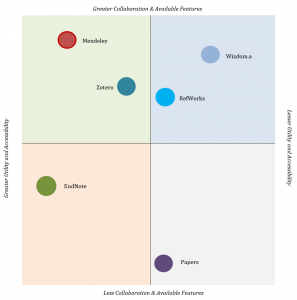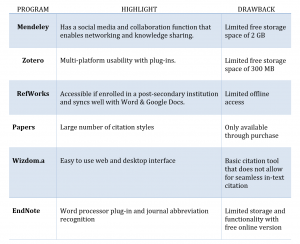1 Referencing Software
By: Blair Wilson
Reference Software Usability Matrix
Many graduate students use a referencing software to keep track of the literature they are using in their thesis work. Many such programs can be downloaded onto your computer for free, and are beneficial for organization, collaboration, and easily keeping track of sources both within and between texts. This matrix illustrates the usability of several major reference software programs. Usability measures include: collaboration, availability features, utility, open-source features, and multi-platform interface capacity. Based on this assessment, Mendeley appears to outperform other reference software on most of matrices below.

| LEGEND
|
| Integrative Engagement & Collaboration – is the degree to which the application can be used to engage peers or engage in knowledge exchange social media engagement and sharing with peers. For example, Mendeley can be used on most operating systems and has greater capacity for knowledge exchange.
|
| Open Source Features – is the degree to which the reference software is freely available and/or has free as well as subscriber features. For example, Refworks is only available through a university student email.
|
| Multi-Platform Interface – is the degree to which the application can be used across platforms such as the operating systems (Windows, Mac, Linux, etc.) web, desktop interface, and mobile apps.
|
| Literature Organizing Database – the amount of available storage and citation styles as well as the ability to annotate articles, capture text from word docs., and/or, PDF docs.
|

Online References and Further Information
This document utilizes data from several pre-existing resources from other universities. The links to these resources are below.
McMaster Library’s Citation Management Software guide
https://library.mcmaster.ca/research/citation-management-software
A guide on reference software developed by Oxford University
https://libguides.bodleian.ox.ac.uk/c.php?g=423116&p=3851803
A chart listing the pros and cons of various reference software programs by Imperial College
A Comparative Analysis of Reference Software found in the summer 2011 Issue of Issues in Science and Technology Librarianship.
http://www.istl.org/11-summer/refereed2.html
An advice article on reference software
https://www.scribendi.com/advice/reference_management_software_solutions.en.html
